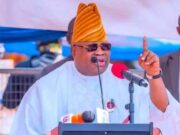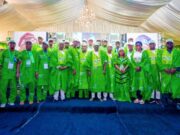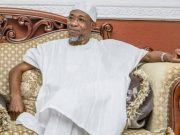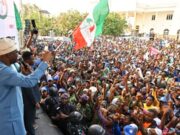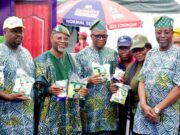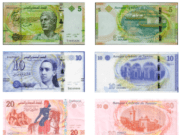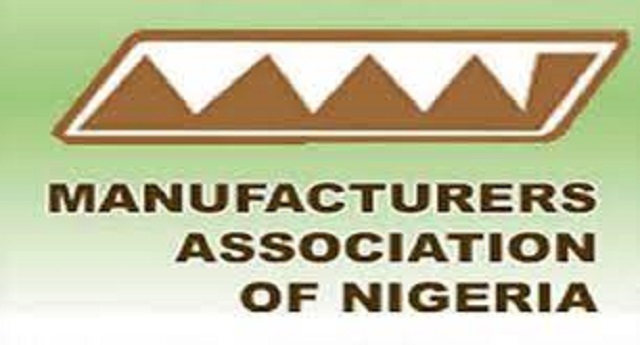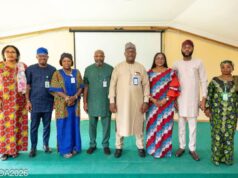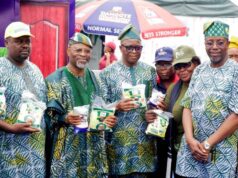For Nigeria to fast-track the actualisation of a $1 trillion economy, there is the need for the Central Bank of Nigeria (CBN) to develop a sustainable framework to channel credit interventions into the manufacturing sector, outside the bank’s direct intervention, the Manufacturers Association of Nigeria (MAN) said on Wednesday.
Its President, Otunba Francis Meshioye, while delivering his address at the MAN Reporter of the Year Award/Presidential Media Luncheon in Ikeja, Lagos, said the CBN should mobilise commercial banks to provide long-term single digit interest loans to the sector.
President Bola Tinubu had at the 29th Nigeria Economic Summit (NES) in Abuja set the target of growing the economy to $1 trillion by 2026 and increasing it to $3 trillion by the end of the decade in 2030.
But Meshioye hinged the target on CBN’s capacity to develop a sustainable framework to channel credit interventions into the manufacturing sector.
“Additionally, it (CBN) should mobilise commercial banks to intentionally provide long-term single digit interest loans to the manufacturing sector to fast-track the actualisation of a $1 trillion dollar economy.
“The apex bank should allow foreign exchange (forex) access for importation of vital industrial input that are not available locally and subject them to backward integration policy,” Meshioye added.
He said MAN offers to be part of a monitoring and evaluation team to ensure that the government gets value for incentives offered to achieve this objective.
Meshioye also called for the management of the floating exchange rate system within an acceptable lower and upper band, pending the actualisation of the country’s net-exporting economy aspirations.
He pushed for the prioritisation of forex and credit allocation to manufacturers, including reducing the number of Bureau De Change operators (BDCs) into large and well-established operators to curb their excesses and untoward operations through effective management and supervision.
Meshioye further called on the government to encourage the inflow of Foreign Direct Investment (FDI) into pre-determined and domestic production-enhancing businesses, and also intentionally guide diaspora remittances into non-oil sectors, especially manufacturing to aid forex inflows and curb rising inflation.
“The CBN should intensify its collaboration with the fiscal authority; Federal Ministry of Finance and by extension, the Tariff Technical Committee (TTC) for proper policy alignment on the appropriate HS Codes for items that Nigeria has sufficient capacity to discourage importation and save scarce foreign exchange,” he added.
Justifying these demands, the MAN president said: “Our country’s economy is in a dire state and our policy makers, more than ever before, need to be intentional about growing the manufacturing sector. There is no country considered as developed that does not give priority to the manufacturing sector.
“There is no gainsaying the fact that manufacturing is pivotal to galvanizing and sustaining the economic growth and development of Nigeria. The government needs to come to the realization that a win for the manufacturing sector is a win for the economy and by extension, a better life for the citizenry.
“Government and its agencies should deliberately abstain from taking harmful and inconsiderate policies that lack adequate inputs of key players that would be affected.”
Meshioye made reference to two instances of such inconsiderate policies within the first two months of this year. The first one was the ban placed on single-use plastics and Styrofoam packs by the Lagos State government.
The second, according to him, was the ban placed on alcoholic beverages in pet bottles and sachet below 200ml by the National Agency for Food, Drug Administration and Control (NAFDAC).
“The former was done outside the timeframe set by the national policy and the latter was based on unfounded assumptions; both without due consideration for the economic and social impact of those unwarranted decisions,” he lamented.
The MAN president said the negative impact of the afore-mentioned policies on the manufacturing industries as well as the huge number of workers whose jobs are on the line cannot be overemphasized.
He insisted that it has become pertinent for government and the private sector to work in tandem to revamp the ailing manufacturing sector, especially at this time, by exploring home grown policy initiatives that will address manufacturers’ peculiar challenges.
“There is a need to mobilize our local resources and more importantly, take deliberate steps to overcome the binding constraints that confront the productive sector. This has to be through frank conversations, effective collaboration and bold decisions that radically depart from the norm,” Meshioye stated.
As he noted, the nation’s economic recovery is highly dependent on the deployment of policy stimulus supported with a synthesis of domestic growth, export focused and robust trade strategies.
This, according to him, will promote resilience, steady growth and ensure that the sector gains meaningful traction going forward.
To actualize a vibrant manufacturing sector this year, Meshioye recommended that the government expend cost saving from fuel subsidy to deploy a bouquet of production focused policies, backed with more structural measures to combat the peculiar inflationary pressures from insecurity, energy and transport cost.
He also called for the overhaul of the power sector and incentivization investment in renewables to boost electricity generation and promote energy-cost efficiency, including encouraging sub-national governments and private investors to leverage the opportunities provided by the Electricity Act 2023 to improve energy security in Nigeria.
Meshioye also said the government should encourage local sourcing of raw materials through comprehensive and integrated incentives to address the challenges of low productivity and imported inflation.
He also called on the government to utilize the 2024 Budget to sustain effort at improving infrastructural developments, especially in strategic industrial hubs to reduce operation and logistics cost and promote competitiveness.
The MAN boss further urged the government to lead by example and give priority to patronage of made-in-Nigeria products in all its purchases and for all government contracts and projects.
“Government should mandatorily upscale patronage of made in Nigeria products by deliberately reducing the excessive reliance of the country on imported products.
“The three tiers of government should enforce the implementation of the Executive Order 003 in the same for their ministries, departments and agencies,” he said.
Meshioye further urged the government to maintain all measures to boost the level of liquidity and degree of transparency in the official forex window even as the backlog of $7 billion forex obligations is being cleared.
Credit: thenationonlineng.net





















